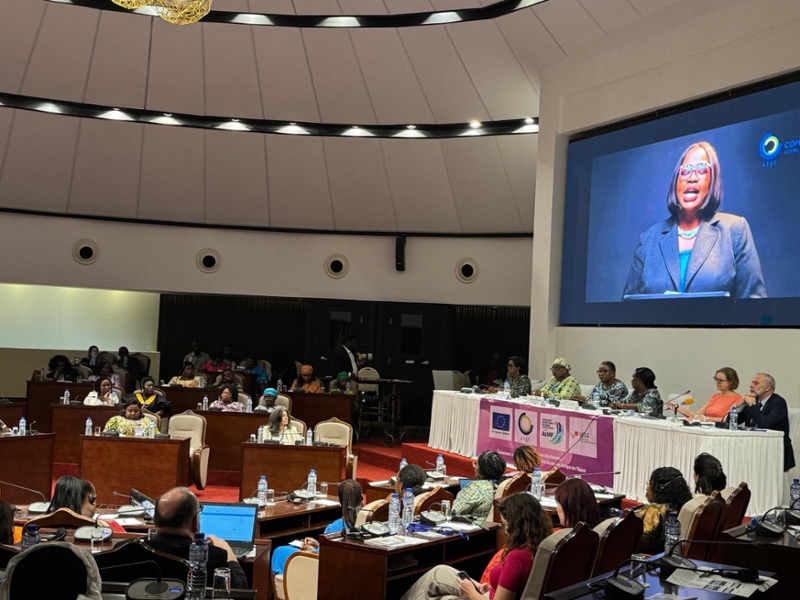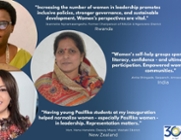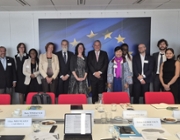Local women leaders coming together in Togo

13 December 2024
Women's political participation and leadership at the local level are critical for achieving gender equality and building a foundation for sustainable development. In West Africa, while progress has been made towards gender equality and women's empowerment, substantial challenges remain, particularly at the subnational level. Young women are especially underrepresented in politics.
This was the impetus for the European Union (EU) in collaboration with the Commonwealth Local Government Forum (CLGF), the Association Internationale pour le Maires Francophone (AIMF) and United Cities and Local Government (UCLG) to organise the Local Women Leaders conference in Lome, Togo, from 5-6 December 2024.
Collaboration and sharing experience
The aim of the conference was to bring together local women leaders from various districts, municipalities and cities with key development partners across West Africa. The desired outcome was to foster collaboration, share experiences, and develop strategies for overcoming barriers to women’s full, equal and meaningful participation in public life and local decision making, thus improving governance and leadership at the local level.
The event brought together 115 participants from 15 West African countries and Cameroon. The theme was political participation of women: an event for local women leaders of Western Africa’. The conference discussed many topics concerning women’s participation in local politics, including the following:
- Regional perspectives on gender disparities in local government
- Creating an inclusive and enabling environment for women’s participation – success stories from the region
- Strategies for engaging more young women to enter politics
- Influencing political parties to increase support for women’s representation
Contribute, comment and question
The sessions were held as plenary and panel discussions, which gave the participants ample time to contribute, comments and ask questions. Councillor Frazette Gibson, the Chairperson of the Commonwealth Women in Local Government Network (ComWLG) and the Chief Councillor of Freeport City Council, Bahamas, made remarks on behalf of CLGF during the opening session. In her presentation, she highlighted the need for political inclusion of women for fairness and to build stronger and more representative communities. She explained that we need more women in positions of power and in making decisions that affect our lives. She also encouraged participants to use the conference as a platform to explore ways to support and build each other up, rather than tearing each other down, as unity and collective strength are key to breaking down the barriers women face in politics.
The CLGF West Africa Regional Programme officer, Ms Joyce Ekuful, moderated the session on influencing political parties for increased support to women’s representation. During that session, it became clear that some political parties in countries, such as Sierra Leone are doing well in terms of their support to women due to the laws in place. However, many other countries are not doing well when it comes the actual implementation, even though the policies in support of women may exist.
Panellists highlighted challenges such as inadequate funding to train women politicians, holding meeting at unfamily friendly hours, and men being gatekeepers to some of the problems that hinder women from advancing in political parties.
For women to succeed in politics, they need to be resolute in their decision to be politicians, structure their messages well, and manage their relationships well by adjusting and adapting. As a way forward, there should be a monitoring team made up of all stakeholders to review the performance of political parties across the region in relation to their policies in place to support women and political parties should reduce their filing fees and all financial obligations for women at every point in time to motivate them.
At the end, the following take aways were realised from the conference:
Women as catalysts for change
We have emphasised that women are not mere beneficiaries of development efforts, but key actors in driving societal transformation. Ensuring women are part of the decision-making processes that impact everyone’s lives is not just a matter of fairness, but of necessity. Sustainable development requires women’s full participation in politics and leadership, challenging ingrained social norms and creating new paradigms for equitable progress.
Addressing underrepresentation through policy
Advocacy remains a cornerstone of ensuring women’s voices are heard at every level. Practical measures like quotas have shown promise, where these policies have increased women's representation in political positions. However, the gap between policy and practice requires vigilant implementation and monitoring to achieve the desired outcomes.
Overcoming stereotypes and financial barriers
Persistent gender stereotypes and financial obstacles remain significant barriers. We’ve recognised the importance of financial independence as a stepping stone for women to enter politics. Legislative reforms, like those being considered in Benin, are essential to create a supportive framework that allows women to thrive in governance and leadership roles.
Engaging men and empowering young women
The road to gender equality requires the active engagement of men as allies. We must focus on empowering young women, providing them with mentorship and support to ensure they are prepared to step into leadership roles and become the change-makers of tomorrow.
Solidarity and inclusion
Discussions have underscored the importance of solidarity among women. Collaboration, rather than competition, will strengthen the collective voice. This includes embracing the diverse perspectives of women across backgrounds, especially those in conflict-affected areas and women with disabilities, thus taking into account an intersectional approach.
Resource mobilisation for economic empowerment
We must prioritise resource mobilisation to ensure aspiring women leaders have access to the economic means to run effective campaigns. Economic empowerment is not just about equity; it’s about levelling the playing field and fostering true competition in the political arena.
Strengthening supportive networks
By nurturing these alliances, we can amplify the momentum for gender equality and inclusive political participation.
Challenging discriminatory practices
We cannot ignore the cultural and traditional barriers that challenge women’s participation. Addressing harmful practices, such as FGM and child marriage, is critical to creating an environment where women can thrive and contribute meaningfully.
Promoting role models and aliances
Showcasing women leaders as role models will inspire future generations. Programmes that foster mentorship and intergenerational dialogue will build a legacy of alliances and leadership that are enduring and impactful.
Education and grassroots engagement
Education is empowerment. By equipping women with knowledge of their rights and mechanisms for enforcing them, we can break societal barriers and empower them as leaders. Grassroots engagement is equally vital, as trust building and community initiatives form the bedrock of meaningful political participation.
Find out more about the work of the Commonwealth Women in Local Governement and our work towards achieving SDG5 and empowering women and girls
Back to News





